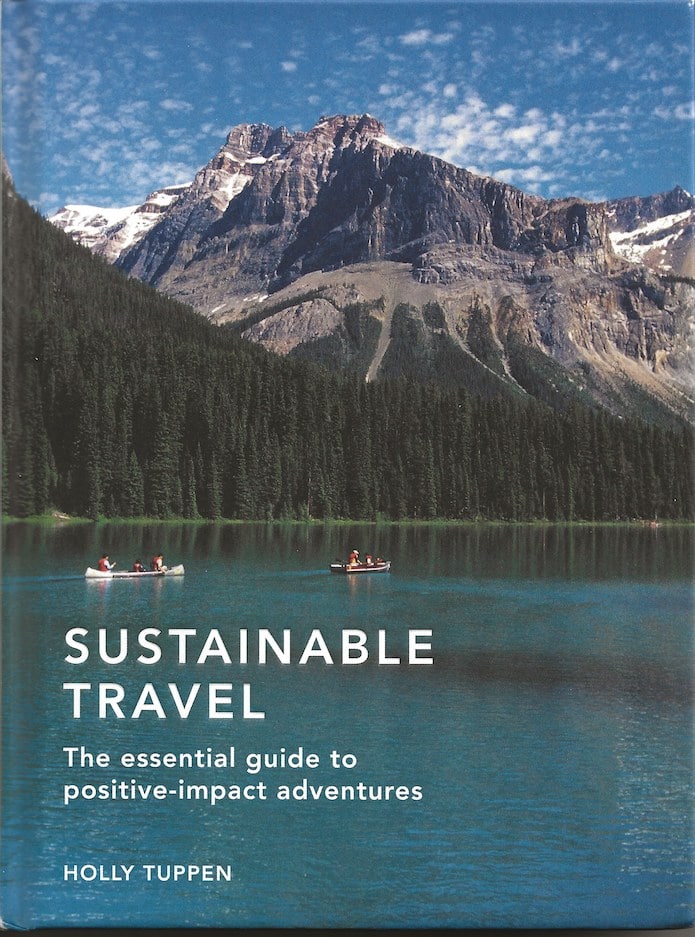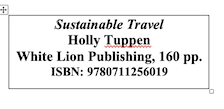
Traveling around the world without flying made Holly Tuppen an expert on low-carbon and positive-impact adventures. In “Sustainable Travel” she shares the keys to responsible tourism.
By Michael Jerzy
A two-year global adventure can be a life-changing experience that defines who we are and how we see the world. Holly Tuppen’s 21st century journey-turned-mission-statement occurred in 2008 when she set off on a 20-month around-the-world- without-flying adventure. A precursor of Greta Thunberg, today she brings the censorious inflexibility of vice regulator Anthony Comstock to Sustainable Travel, a book that redefines the protocols, practicalities, and purposes for “conscientious” travel.
The author’s background and beliefs focus on travel with a “positive impact.” She gives examples of how her ideas can be put into action. Now, years later, her travel guide reflects her resume and how her vision for travel as a positive impact has evolved.
Tuppen’s background involves stints as the editor of Green Hotelier, Communications Manager at the International Tourism Partnership (ITP), corporate social responsibility specialist for The World Travel and Tourism Council and writer for The Guardian, The Telegraph, and Conde Nast Traveler. Drawing on her experience, she has created a compelling guide to how she believes travel needs to be “reimagined” today.
Sustainable Travel introduces the ideological “elephant in the room” right up front. “If there’s one question rocking our wanderlust these days, it’s this: is it morally acceptable to travel the world for fun while it burns up around us?”
Tuppen tries to show that the travel choices we make contribute to the global climate crisis. Her goal is to promote “travel that heals; travel that brings us closer to our natural and cultural heritage; travel that uplifts the host as much as the visitor; travel that changes hearts and minds for the better.” In other words, travel now can––and should––have a purpose beyond our individual experiences.
Can it be done? Can we apply global sustainability goals to our practical travel plans? Or for that matter, should we even travel at all when we have hard evidence that it contributes to global warming and our planet’s demise? Sustainable Travel considers these questions, making its title, unfortunately, ironic.
There are two major sections: what is happening and what we need to do. There is a redefinition of “sustainable” and how we will travel. The reality, however, is those two terms rarely connect.
The introduction dives into the ongoing global climate change crisis, discussing biodiversity versus consumerism and the need to reduce carbon emissions while neutralizing our carbon footprints.
Tuppen explains what we do on a daily basis and its global negative impact. It’s eye-opening. Roughly 20% of the world’s population now travels, tourism accounts for 12% of the world’s carbon emissions, and over the next century, “sea levels will rise by three feet, displacing 680 million people in low-lying coastal zones.” And just like every other aspect of human life, travel and tourism must be revolutionized.
The global issues presented are daunting and seemingly untenable. But Tuppen believes they rarely are appreciated, not even by those who try to be careful about potential environmental impact. She nevertheless argues that they are a necessary starting point as a foundation for achievable improvements. “Once you’re armed with facts and practical information, it will become easier to rely on intuition and instinct to navigate what is and isn’t a responsible and sustainable travel choice.”
In other words, you may not think about the global climate issues every day, but if you’re aware of them then at least you’re better prepared.
Beyond the economic and environmental issues affected by modern travel, Tuppen demonstrates that those who explore and those who accommodate must rely on each other. A section explaining “regenerative travel” describes the mindset that should inform every trip, every tour, every exploration. It’s the positive impact on a local population that endows a traveler’s experience with worth, substance, even profundity. So a logical extension of committing to sustainability becomes the idea of “voluntourism,” of empowering local populations and giving back to rural communities as a means of safeguarding a culture just as much as visiting a region that celebrates it. “Rather than following the crowds, we can use our travels to help lesser-known heritage sites or marginalized cultures.” Just as sustainable travel implies a “light footprint,” it also respects cultural heritage and promotes continuity protection of local communities.
The lion’s share of Sustainable Travel is the instructional how-to guide for a “positive impact adventure” that becomes a purposeful, meaningful experience. Every step is explained through the perspective that less is more. How to get there? Avoid planes and choose trains, ferries, or even cycling or walking. Where to stay? That’s going to mean “rethinking luxury” and focusing more on eco-hotels, hostels, or sensitive design lodges that dedicate themselves to biodiversity, naturalization, and a “green approach.” Arguably the most impactful sentiment is that sustainable travel is a focused way of life. Citizens of the world ask yourselves. Is something easy or positive, self-centered or forward-thinking?
The most practical section may be the one that asks, “What to pack?” Beginning with the three Rs––Reduce, Reuse, Recycle––it explains the need for secondhand fashion and plastic-free bags. It’s the kind of advice that politicizes the approach to travel when the true intention is so much simpler and action-oriented: you don’t need to pack that much. Most of what you need can be obtained wherever you go, so by packing lightly, you’ll be doing what you hope to do subconsciously. “If you want to give back, always do so through registered charities or by supporting social enterprises and locally run businesses.” Travel is rarely isolated, so outreach and supporting local communities become second nature to those looking for their trip to benefit local destinations.
Like so many recent guidebooks, Sustainable Travel ultimately concludes with a full spectrum of referrals, suggestions, agencies, and opportunities all designed to make your personal experiences truly meaningful and impactful. The recommendations are an essential contact list for those seriously considering their first “sustainable travel” experience or the longtime frontier practitioners who are looking to intensify their involvement.
The author’s professional expertise is packaged for the true believer. She is clear that her own journey as a traveler, then an environmental activist, and now an advocate for radical change have been distilled into a guide to recruit true believers like herself. For a discussion of sustainability and travel, it walks a fine line.
This book is not for everyone; not even for many and perhaps only a select few. For better or worse, that is its weakness. Its scope is global, a topic that invites more discussion and deliberation. But its instruction is politicized and promotes a progressive bias not widely shared. As is the nature of all travel guides––but especially those attempting to deal with the specter of global crisis––the passage of time will make it less practical. This year Tuppen’s referrals may be the Gold Standard, next year many will have disappeared.
Travel enthusiasts will ultimately consider Sustainable Travel a fundamental redefinition that makes it a double-edged sword. Tuppen’s cutting edge approach is radical when trying to compensate for the impacts on climate change. But it becomes a humorless scold of little appeal to a 20-something who wants to see the world, live the dream and make lifelong memories. In other words, it’s a bridge too far for those seeking a traditional travel experience. Nonetheless, it presents an active starting point for those like Tuppen who want travel experiences that serve a progressive political purpose.
The author asks how we can do better and make a difference. “Genuinely sustainable travel inspires us to become caretakers of the natural world, but it doesn’t stop there. It is also solution-focused; it improves destinations, uplifts communities, and provides a financial incentive to protect landscapes, wildlife and culture.” In that sense, Holly Tuppen provides the clarion call for those who believe that something must be done, and must be done now.![]()
 Michael Jerzy is a freelance writer who began as a Los Angeles playwright and moved on to film and television. Throughout his career he’s been a copywriter, editor, reviewer, and traveler, ultimately dedicating himself to college admissions counseling for international ESL STEM students.
Michael Jerzy is a freelance writer who began as a Los Angeles playwright and moved on to film and television. Throughout his career he’s been a copywriter, editor, reviewer, and traveler, ultimately dedicating himself to college admissions counseling for international ESL STEM students.

